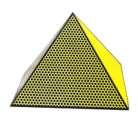
Pyramid

Pyramid
Signed Print
Roy Lichtenstein
£3,000-£4,500
$6,000-$9,000 Value Indicator
$5,500-$8,500 Value Indicator
¥28,000-¥40,000 Value Indicator
€3,450-€5,000 Value Indicator
$30,000-$45,000 Value Indicator
¥620,000-¥930,000 Value Indicator
$4,000-$6,000 Value Indicator
There aren't enough data points on this work for a comprehensive result. Please speak to a specialist by making an enquiry.
38 x 50cm, Edition of 300, Screenprint
Auction Results

Track auction value trend
Meaning & Analysis
Created in 1968, Roy Lichtenstein’s Pyramid is a clever study of Minimalism and a fascinating reinterpretation of an ancient masonry structure. Although executed through the means of a screen printing process, Pyramid is assembled into a refined sculpture at Lichtenstein’s expert hands. The work was later also published as a two-dimensional colour lithograph titled Pyramids.
Pyramid’s scaled back display is monochrome and exact in design. Lichtenstein uses bright yellow pigments to create his triangular shape and delineated Ben Day dots to invoke dimension. The artist’s representational manner here is comparable to his Cathedrals and Haystacks. The work has the same visual quality and eligibility as its source material, yet it is a highly mechanised structure; a true expression of the 20th century.
However, Pyramid is more than just an exercise in abstraction and geometry. It is a graphic rendition of a historical and architectural landscape. The sculpture relies on the symbolic and cultural potency surrounding the original Egyptian Pyramids. The artist is especially indulged by the supernatural connotations of the masonry structure. Finally, it must be noted that Pyramid represents a dramatic progression within Lichtenstein’s style. It acts as the artist’s first official move towards a more indirect and philosophical approach to artistic form.